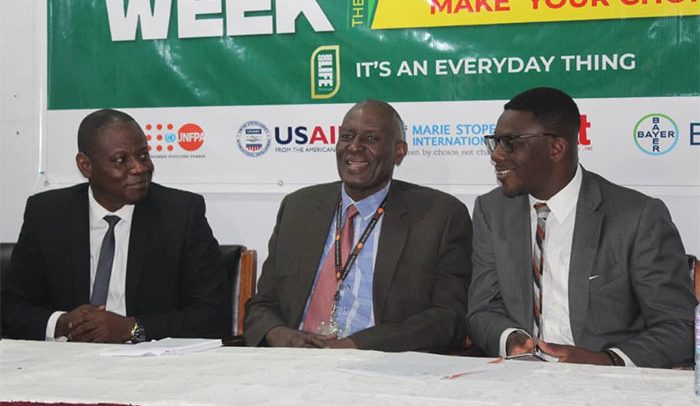(from left) Dr. Patrick Aboagye, Ismael Ndifuna, chief specialist Family Planning, UNFPA and Niyi Ojuolape, UNFPA country representative.
Director of the Family Health Division, Ghana Health Service, Dr. Patrick Aboagye, has reiterated government’s commitment to addressing the financial barriers to quality Family Planning (FP) services in the country.
He said government has undertaken various initiatives over the years to ensure that all women and men have a wide range of safe and affordable FP methods and services that suit their lifestyle and reproductive health goals, to choose from.
He said the national health insurance law for instance, has been amended to include FP methods which would make clinical FP services like permanent methods, IUDs, Implants and Injectables free of charge at all public sector facilities and private sector facilities subscribed to the scheme.
Dr. Aboagye noted that the law which is currently being implemented on a pilot basis in seven districts will inform modalities for full implementation of FP in the NHIS benefit package across the country.
He further observed that the Ministry of Health in 2015 dedicated a significant proportion of its support from the West African Health Organization (WAHO) of about one million dollars to the purchase of FP commodities and similarly allocated three million dollars for the procurement of FP commodities in the 2016-2017 MAF plans and budget.
“Just recently President Nana Akufo-Addo through the Ministry of health has allocated a health/commodities budget line that includes family planning commodities; undoubtedly a step in the right direction,” he said.
He was speaking at the 2019 Launch of the National Family Planning Week in Accra themed ‘Family Planning: Know Your Options, Make Your Choice’.
He said ensuring sustainable financing for FP programmes and universal access to quality services definitely plays into the choice everyone has to decide whether or not to have children, when to have them and how many to have.
Dr. Yaa Asante, Programme Manager Family Health Division, presenting the state of FP in Ghana said there has been a three percent increase in the use of modern contraceptive methods among married women, from 22 per cent in 2017 to 25 per cent in the 2017.
She however noted that the unmet need for FP was still high, 26.3 per cent, attributing it to poor provider attitude to the young and sexually active, inadequate male involvement, persistent rumours, missed opportunities for post-partum and post abortion family planning and inadequate infrastructure and equipment for provision of services.
By Jamila Akweley Okertchiri

